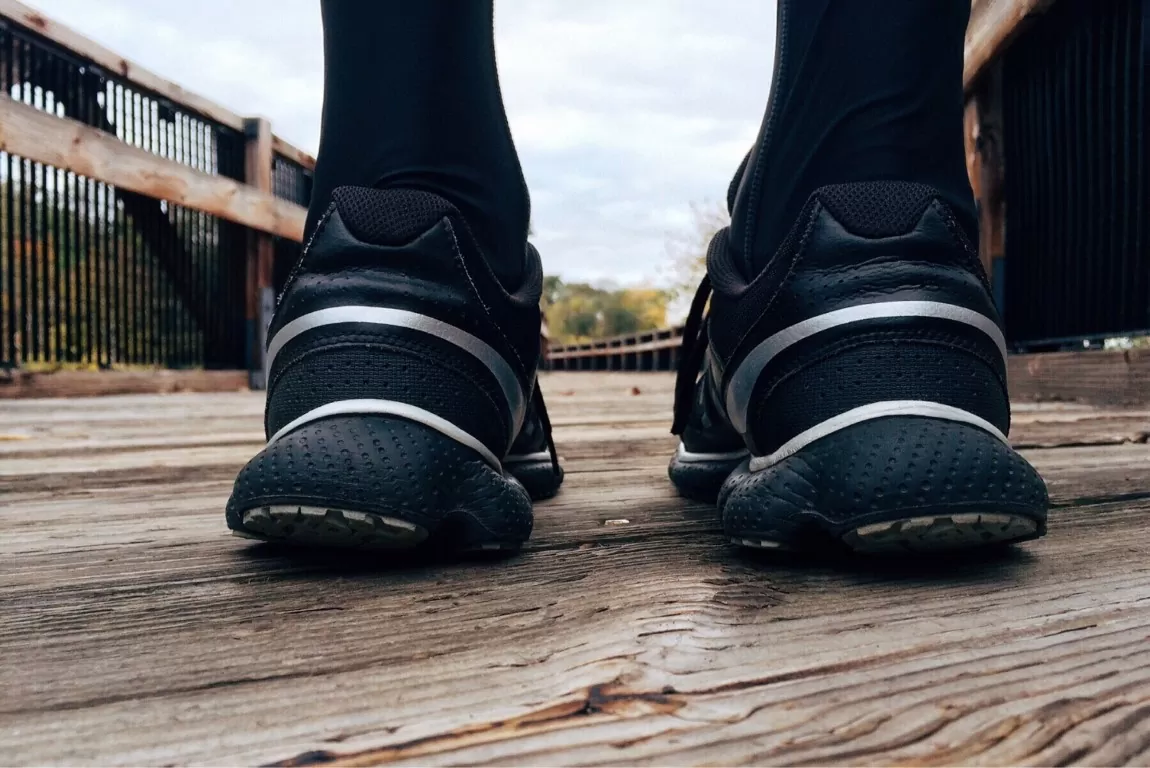Choose shoes with good arch support and cushioning to relieve Achilles tendonitis pain effectively. It’s crucial to consider your footwear to alleviate discomfort and support healing.
Achilleas tendonitis can be a painful condition caused by overuse or improper footwear choices. Wearing the right shoes is essential for managing the condition and preventing further strain on the Achilles tendon. Opt for shoes with proper arch support and cushioning to reduce pressure on the affected area.
Look for shoes with a slightly raised heel to help take strain off the Achilles tendon. Additionally, shoes with good shock absorption can help cushion your steps and reduce impact on the tendon. Ensuring that your shoes fit well and provide adequate support is key to improving your comfort and mobility while dealing with Achilles tendonitis.

Credit: www.treatmyachilles.com
Choosing The Right Footwear
When dealing with Achilles tendonitis, it’s crucial to choose appropriate footwear that provides the necessary support and cushioning to alleviate pressure on the affected area. Wearing the right shoes can make a significant difference in managing discomfort and aiding in the recovery process.
Supportive Shoes
Supportive shoes play a vital role in promoting proper foot alignment and reducing strain on the Achilles tendon. Look for shoes that feature sturdy heel cups to stabilize the heel and prevent excessive movement that can aggravate the condition.
Cushioned Shoes
Cushioned shoes with adequate padding in the heel area can help absorb impact and reduce pressure on the Achilles tendon. Opt for shoes with soft midsoles that provide cushioning to minimize discomfort during walking or any physical activity.
Best Shoe Types For Achilles Tendonitis
Introduction:
Achilles tendonitis can be painful, but wearing the right shoes can alleviate discomfort and promote healing. Here are the best shoe types for Achilles tendonitis:
Running Shoes
Running shoes provide cushioning and support, reducing strain on the Achilles tendon.
Orthopedic Shoes
Orthopedic shoes are designed to provide optimal arch support and stability for those with Achilles tendonitis.
Elevated Heel Shoes
Elevated heel shoes can help alleviate strain on the Achilles tendon by reducing the range of motion required.
Features To Look For In Shoes
Read More-Official Basketball Rules And Regulations Best For Beginners in 2024
When dealing with Achilles tendonitis, choosing the right shoes is crucial for providing relief and support to the affected area. Proper footwear can help to alleviate discomfort, reduce strain on the Achilles tendon, and promote healing. Here are the key features to look for in shoes when dealing with Achilles tendonitis:
Arch Support
Proper arch support is essential for individuals with Achilles tendonitis. Shoes with adequate arch support help distribute pressure evenly, reducing the strain on the Achilles tendon. Look for shoes with built-in arch support to provide stability and alleviate discomfort.
Heel Cushioning
Heel cushioning is essential for individuals with Achilles tendonitis. Shoes with sufficient heel cushioning help absorb shock and reduce impact during walking, providing relief to the affected tendon. Opt for shoes that have ample padding and cushioning in the heel area to minimize strain on the Achilles tendon.
Stability And Control
Shoes that offer stability and control can help individuals with Achilles tendonitis maintain proper foot alignment and prevent excessive pronation or supination. Look for shoes with a supportive midsole and a firm heel counter to promote stability and control, reducing strain on the Achilles tendon.
:max_bytes(150000):strip_icc()/Health-Symptoms-of-Achilles-Tendonitis-Horiz-2-49b081fbbd024daea2459739da5b632d.jpg)
Credit: www.health.com
Footwear To Avoid
Avoid wearing high heels, flip-flops, and unsupportive shoes with Achilles tendonitis. Opt for low-heeled, cushioned footwear with good arch support to alleviate pressure on the tendon. Look for shoes with a firm sole, adequate cushioning, and a snug fit to provide stability and reduce discomfort.
Headings Must Be In Html Syntax.
Flat Shoes
Wearing flat shoes is not recommended for individuals with Achilles tendonitis. Flat shoes lack proper arch support, which can put additional strain on the already inflamed tendon. These types of shoes offer little to no cushioning and fail to provide adequate shock absorption when walking or running.
Wearing flat shoes also promotes an unnatural gait, as the heel and forefoot do not align correctly. This misalignment can further irritate the Achilles tendon, worsening the condition and causing increased pain and discomfort.
High Heels
Say goodbye to your beloved high heels if you’re suffering from Achilles tendonitis. As fashionable as they may be, high heels can wreak havoc on your Achilles tendon. The elevated heel places excessive stress on the tendon, leading to inflammation and pain.
High heels alter your natural walking pattern and force your foot into an unnatural position. This increased angle puts additional strain on the Achilles tendon and can lead to further damage and prolonged healing time.
Avoiding high heels is crucial for allowing the tendon to heal properly. Opting for more supportive and comfortable footwear will reduce pressure on the Achilles tendon, promoting healing and alleviating pain.
Tips For Proper Shoe Fitting
Proper shoe fitting is crucial for Achilles tendonitis. Opt for shoes with proper arch support and cushioning to reduce strain on the tendon. Look for footwear with a low heel and good stability for added comfort and support.
Consulting A Podiatrist
If you are experiencing Achilles tendonitis and wondering what kind of shoes to wear, it is always a good idea to consult a podiatrist. A podiatrist is a foot specialist who can provide expert advice and recommendations tailored to your specific condition and needs. They will assess your foot structure, gait, and any underlying issues that may contribute to your Achilles tendonitis. By consulting a podiatrist, you can ensure that you receive professional guidance on selecting the right shoes to alleviate your symptoms and prevent further damage.
Trying Different Sizes
When it comes to finding the right shoes for Achilles tendonitis, it is essential to try different sizes. Your feet may vary in size or shape, and wearing improperly-fitting shoes can exacerbate your condition. Trying different sizes allows you to find the perfect fit that provides adequate support and cushioning for your Achilles tendon. Remember to measure both feet, as they may not be the same size. Avoid shoes that are too tight or too loose as they can cause discomfort and potentially worsen your symptoms.
One helpful tip is to try on shoes in the afternoon or evening when your feet tend to be slightly swollen. This way, you can ensure that the shoes you choose will still fit comfortably even when your feet are at their largest.
If you have a high arch or flat feet, you may also need to consider specialized shoe options that cater to these foot structures. Look for shoes with arch support or orthotic features to help prevent excessive strain on your Achilles tendon. Consulting a podiatrist can be particularly useful in determining the most suitable shoe type for your foot structure.
Proper Heel Support
Proper heel support is crucial when selecting shoes for Achilles tendonitis. Look for shoes with a firm and supportive heel counter. The heel counter is the back portion of the shoe that surrounds and supports the heel. It should be sturdy enough to prevent excessive side-to-side movement of the heel, which can aggravate the Achilles tendon.
Additionally, shoes with a slightly elevated heel, known as a heel drop, can help relieve tension on the Achilles tendon. A small heel drop encourages a more natural foot position and reduces strain on the tendon. However, it is important to avoid overly high heels, as they can put excessive stress on the Achilles tendon and contribute to further problems.
Cushioning And Shock Absorption
Shoes with ample cushioning and shock absorption are beneficial for individuals with Achilles tendonitis. Look for shoes that have cushioned insoles and midsoles, as they can help absorb the impact of each step and reduce strain on the tendon. Avoid shoes with thin or worn-out soles, as these may provide inadequate shock absorption and increase the stress on your Achilles tendon.
Consider shoes with a combination of cushioning materials such as foam or gel inserts for enhanced comfort and support. These additional cushioning features can help alleviate pain and discomfort caused by Achilles tendonitis.
In conclusion, when it comes to managing Achilles tendonitis, finding the right shoes is crucial. Consulting a podiatrist, trying different sizes, ensuring proper heel support, and prioritizing cushioning and shock absorption are important factors to consider. By adhering to these tips for proper shoe fitting, you can provide the necessary support and relief for your Achilles tendon, helping to alleviate your symptoms and promote overall foot health.

Credit: www.clickphysiotherapy.com.au
Frequently Asked Questions Of What Kind Of Shoes To Wear With Achilleas Tendonitis
What Should I Wear If I Have Achilles Tendonitis?
For Achilles tendonitis, wear supportive shoes with cushioning and arch support to reduce strain and pain. Opt for footwear that provides stability and comfort to protect and support your injured tendon.
Are Flat Shoes Better For Achilles Tendonitis?
Yes, flat shoes can be better for Achilles tendonitis as they reduce strain on the tendon. They provide a stable base and better support for the foot, decreasing the risk of aggravating the condition.
Can Shoes Affect Achilles Tendonitis?
Shoes can have an impact on Achilles tendonitis. Wearing shoes with inadequate support or a heel that is too high can worsen the condition and cause discomfort. Opt for footwear with proper arch support and cushioning to alleviate pressure on the Achilles tendon.
What Worsens Achilles Tendonitis?
Overuse, repetitive activities, sudden increase in intensity, inadequate warm-up, and tight calf muscles worsen Achilles tendonitis.
Conclusion
Choosing the right shoes is crucial for managing Achilles tendonitis. Prioritizing comfort, support, and cushioning can help alleviate pain and promote healing. Opt for shoes with proper arch support, shock absorption, and a cushioned sole to protect the affected area.
Remember to consult a healthcare professional for personalized advice. Finding the right shoes can make a significant difference in managing Achilles tendonitis.



